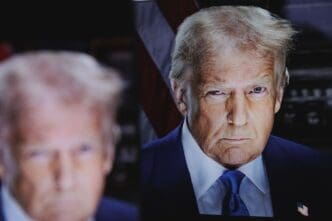Executive Summary
- Powerful business lobbies like the US Chamber of Commerce and the Business Roundtable have remained notably quiet regarding President Trump’s perceived abandonment of traditional free-market principles and aggressive interventions in the private sector.
- Trump has directly intervened in private enterprise through actions such as publicly criticizing CEOs, demanding personnel changes, and exploring the use of taxpayer money to acquire stakes in companies, departing from standard free-market playbooks.
- The silence from Corporate America is largely attributed to a pervasive fear of drawing White House ire and a strategic calculation to avoid confrontation, weighing the risks of public opposition against potential benefits like promised tax cuts.
The Story So Far
- Powerful business lobbies, historically champions of minimal government intervention, have remained notably quiet regarding President Trump’s aggressive and unconventional interventions in the private sector, which depart significantly from traditional free-market principles. This silence is largely attributed to a pervasive fear of drawing White House ire, as these groups weigh the risks of public opposition against potential benefits, prioritizing avoiding becoming targets even as Trump’s actions challenge long-held business orthodoxies.
Why This Matters
- The notable silence from powerful business lobbies regarding President Trump’s aggressive interventions in the private sector signifies a significant shift in Corporate America’s relationship with the executive branch, indicating a strategic prioritization of avoiding presidential ire and seeking potential economic benefits over upholding traditional free-market principles. This dynamic suggests a potential long-term impact on corporate autonomy and the traditional checks on executive power, as major business groups appear willing to forgo public criticism of policies that depart from established market norms.
Who Thinks What?
- Powerful business lobbies, including the US Chamber of Commerce and the Business Roundtable, have remained notably quiet regarding President Trump’s perceived abandonment of traditional free-market principles, attributing their silence to a pervasive fear of drawing White House ire and a strategic calculation of potential benefits.
- President Trump and his administration have departed from standard free-market playbooks through aggressive interventions in the private sector, including taking credit for corporate decisions, publicly criticizing CEOs, and exploring unconventional arrangements like acquiring stakes in companies.
- Critics and observers argue that President Trump’s direct engagements represent assaults on free enterprise, alarming lawmakers, investors, and legal experts, and contend that corporate citizens are harmed when a leader uses the power of the presidency to target perceived enemies.
Powerful business lobbies, including the US Chamber of Commerce and the Business Roundtable, have remained notably quiet regarding President Donald Trump’s perceived abandonment of traditional free-market principles and his aggressive interventions in the private sector. This silence contrasts with their historical willingness to challenge government actions, raising questions about the motivations behind their current restraint as Trump’s influence on Corporate America expands.
Shifting Corporate Stance
Historically, American conservative orthodoxy championed minimal government involvement in business. However, when faced with President Trump’s efforts to exert control over private enterprise, key advocacy groups have largely refrained from public criticism. The US Chamber of Commerce, for instance, has previously initiated lawsuits against federal agencies and the Biden administration over regulatory matters.
Despite their past litigiousness, neither the Chamber of Commerce nor the Business Roundtable has publicly denounced what some observers describe as Trump’s more direct assaults on free enterprise. Both groups had previously criticized Trump’s trade war, but their silence on his broader interventions has been conspicuous.
Trump’s Interventions in Private Enterprise
President Trump, often described as a self-styled dealmaker, has departed from standard free-market playbooks in ways that have reportedly alarmed lawmakers, investors, and legal experts. His administration’s approach suggests that no matter is too small or too large for his input when it comes to exerting influence over Corporate America.
Examples of Trump’s direct engagement include taking credit for corporate decisions, publicly criticizing CEOs, and demanding personnel changes within major companies like Intel and Goldman Sachs. His administration has also explored unconventional arrangements, such as reportedly requiring companies to funnel 15 percent of their China sales to the US government in exchange for export licenses.
The White House’s push into private businesses took another turn when officials confirmed the administration was considering using taxpayer money to acquire a stake in struggling chipmaker Intel. This potential move underscores a willingness to directly intervene in corporate ownership, a significant departure from typical market-oriented policies.
Reasons for Corporate Silence
The observed silence from Corporate America is attributed to several factors, including a pervasive fear of drawing White House ire. Sources indicate that some trade groups have drafted plans to push back against the administration’s actions, but these initiatives were reportedly shelved at the request of members concerned about becoming targets.
One perspective suggests that any business or individual speaking out risks “a risk that can’t be calculated,” describing an “Eye of Sauron” element. The calculus for business leaders appears to involve weighing the risk of public opposition against the potential benefits of alignment, such as promised tax cuts.
Critics argue that “Corporate citizens are harmed just like flesh and blood citizens are harmed when you have a leader who… actively seeks to monetize public office and actively seeks to use the power of the presidency to harm perceived enemies or anyone who doesn’t appropriately capitulate.”
The observed restraint from powerful business lobbies marks a significant shift in the relationship between Corporate America and the executive branch. This silence suggests a strategic calculation by corporate leaders, prioritizing potential economic benefits and avoiding direct confrontation with President Trump, even as his administration challenges long-held free-market principles.








